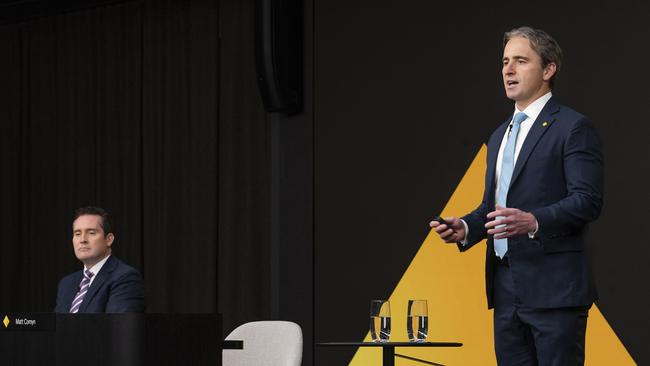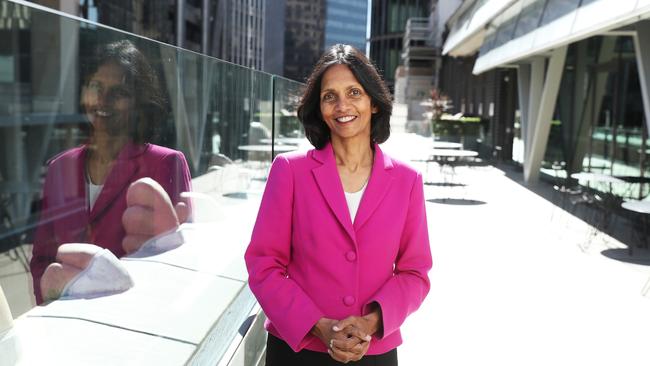Australian business leaders say the profits of global tech giants aren’t scrutinised enough
Corporate Australia has criticised politicians for alleging business profit gouging while giving big international tech companies ‘a free pass’ on their margins.

Corporate Australia has slammed politicians for a spate of attacks over profit gouging, while big international tech companies “get a free pass’ on their bumper profit margins.
Commonwealth Bank chief executive Matt Comyn said it was concerning tech companies like Apple and Facebook’s Meta were not being subjected to as much scrutiny as big local corporations, many of which have recently faced accusations of price gouging.
Airlines, super markets, insurers, energy companies and the banks have all been accused by politicians and the public of taking advantage of a post-pandemic spike in inflation to push prices as high as possible, squeezing households facing a cost of living crunch.
But Mr Comyn said the profitability of Apple, for example, was much higher than margins at Coles – yet politicians, regulators, the public and the media had not paid as much attention.
“I sometimes worry and wonder about the criticisms that are levelled at Australian companies, and particularly large (ones),” Mr Comyn told a business conference in Sydney.
He said Australia’s 10 largest businesses employed more than a million workers and the top 15 represented about 42 per cent of corporate tax paid in the country. Profit margins at supermarket supplier Coles were a very thin 2.5 per cent, compared with Apple’s net profit margin of about 36 per cent.
“One of the things that I find sort of extraordinary, is potentially the lack of scrutiny, certainly insufficient scrutiny, across some of the tech companies in particular, which have large businesses in Australia,” he said.
Citing Apple’s tax transparency report for 2022, Mr Comyn highlighted that the company paid only about 4 per cent tax despite capturing $12bn in revenues from Australia, which was tiny compared to CBA’s own 30.5 per cent.

Macquarie chief executive Shemara Wikramanayake avoided criticising the tech giants, but said regulators needed to get the balance right between fostering innovation and reining in companies with strong entrenched market positions.
Peter Costello, chairman of Nine Entertainment, which sponsored the conference, described tech giants like Meta and Google as “monopolies on a global scale that would make the Rockefellers blush”.
Mr Comyn has been in a long-running a stoush with Apple over the tech giant’s dominance of the local “tap and go” segment of the payments system.
Mr Comyn’s calls for Apple to free up the Near Field Communication (NFC) chip on its phones so that the bank’s own apps can use it have been largely ignored by the American company.
On Monday, Mr Comyn said the competition regulator should not have blocked CBA in 2015 from leading collective bargaining on behalf of the industry regarding access to Apple’s NCF.
The Australian Competition & Consumer Commission is conducting an investigation into alleged supermarket price gouging and is also scrutinising the bank deposit market.
Mr Comyn criticised the tech giants’ lack of transparency, saying their “attitude” when they faced parliamentary committees was “completely different” to that of large local companies that paid a lot more tax and employed Australians.
“And I do, I absolutely question and wonder why,” he said.
“These are the undisputed world champions of kabuki theatre and I think they should be subjected to a lot more scrutiny in Australia.
“I read the Prime Minister’s comments recently with Meta’s decision (to stop paying for Australian news), where he said something along the lines of it’s not fair that companies are able to benefit from the investments in either infrastructure or people and to take advantage of that.
“That was referring to media. Clearly, that could be in my view applied across a number of different industries, not the least of which is banking.”
Prime Minister Anthony Albanese’s comments came after the parent company of Facebook earlier this month said it would no longer pay media outlets for the material they provided on the social media site.
Mr Comyn again called on the Labor government to “accelerate” the introduction of payments legislation that will empower the Reserve Bank to police the tech platforms, which don’t face as many regulations as the banks.
As mobile payment platforms are widely adopted, the central bank is looking into mobile payment apps and considering whether it needs to intervene.
Ms Wikramanayake said profits were not divorced from delivering good outcomes for customers and communities, and companies needed to win their social licences to do that.
She avoided criticising the tech giants, saying the mega companies dubbed the “Magnificent Seven” that were driving earnings and share price growth in the US were doing “an amazing job for the US and the world”.
She said the US had managed to dodge a recession in part thanks to their entrepreneurialism, which was delivering generative AI to the world.
“I think the US needs to balance fostering that innovation with the strong entrenched positions those firms now have,” she said.
Speaking about Australia’s own economic prospects, the business leaders also stressed that housing and development were fundamental issues with the potential to either limit or drive economic growth and cost of living pressures.
“There’s a whole lot of roadblocks there (for housing) that require us all to come together to deliver them. If we crack it we will contribute value to the community,” Ms Wikramanayake said.
Telstra chief executive Vicki Brady said one of the biggest unexpected challenges the company faced when rolling out almost 14,000km of intercity fibre across the nation was the “fragmentation” and complexity of land approvals.
“I’m talking hundreds of land access tasks, from approvals, consultations … And don’t get me wrong, we’ve got to get this right so I’m not saying we should ignore that,” she said. “I think as a country the race is on. This infrastructure needs to be built.”




To join the conversation, please log in. Don't have an account? Register
Join the conversation, you are commenting as Logout